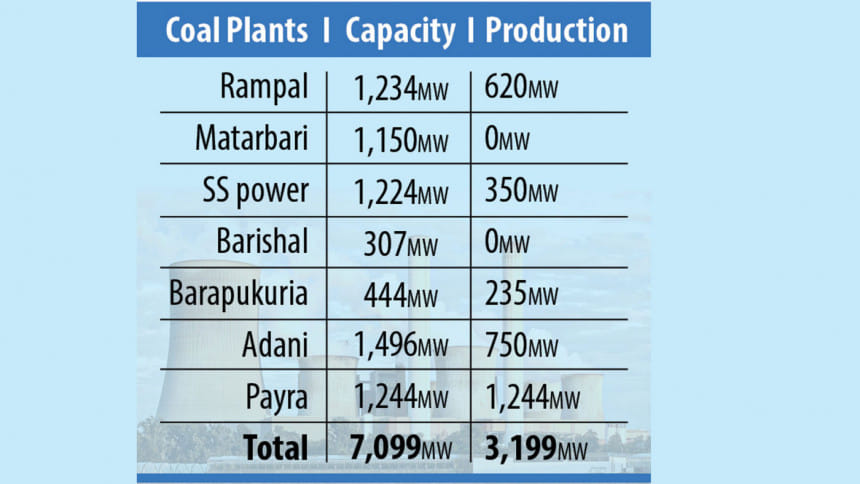Now coal power plants scaling back production

Coal-fired power plants are dialling down production or even shutting down due to financial, legal or technical issues, leading to power cuts across the country, especially the rural areas.
Gas-fired power producers have already been in this state since June.
The country's seven coal-based power plants, with a combined capacity of 7,099 megawatts (MW), are producing around 3,199MW.
India's Adani Power Jharkhand Ltd, the single largest power source of Bangladesh, halved its supply last week. Bangladesh owes it about $846 million.
On October 24, Matarbari 1,200MW Ultra Super Critical Coal Fired Power Plant ran out of coal, according to the data of Power Grid Bangladesh PLC. It was running at half its capacity for the previous couple of weeks.
Officials said it may not be possible to restart the plant before December.
"Coal procurement process is underway. We hope that the power production will be restarted when the coal arrives in mid-December," said Md Adnan Ibrahim, executive engineer (procurement) of Coal Power Generation Company Bangladesh Ltd.
He said his company has floated tenders for procuring around 3.5 million tonnes of coal. The plant needs around 10,000 tonnes a day.
Ibrahim said a change of coal supplier sparked legal issues that caused delays in purchasing coal.
The Barishal 307MW power plant, meanwhile, is down for maintenance, according to the Bangladesh Power Development Board (PDB).
Rampal and SS Power have been producing at half their capacities for a long time due to coal shortage.
A source at the PDB said the plants are running low on coal and producing less electricity mainly due to dollar crunch.
Two of the three units of Barapukuria power plant are in production and have been producing around 235MW, against the combined capacity of 444MW. The largest 275MW unit has been producing around 170MW due to mechanical problems, the PDB said.
Only Payra power plant has been producing at capacity.
The PDB has been producing around 11,000MW during day-time peak hours and around 13,000MW in the evening peak hours, which are about 1,000MW short of the demand.
Barishal has the blessing of Payra. It is the only division that is not experiencing power cuts.
Bangladesh's total power generation capacity is 27,086MW, including Adani's plant.
Since early June, gas shortage was the major concern for the PDB after one of the two floating storage and regasification units faced technical problems.
Bangladesh had been able to regasify only 600 million cubic feet of imported liquified natural gas a day (mmcfd) till late September, instead of the usual 1,100 mmcfd.
The regasification has improved to 900 mmcfd. Still, only 5,500MW is being produced from gas-based power plants which have a total capacity to produce 12,064MW.
Khandaker Mokammel Hossain, member (generation) of PDB, said they have increased gas supply to power plants, but now they have shortage of coal.
"Procedures must be followed to import coal. If I want to import now, it is not possible. We need time to complete the procedures," he told The Daily Star.
Rabiul Islam, an onion wholesaler at Hilli of Dinajpur, said he lost half of his imported onions due to frequent power outages over the last couple of days.
"Due to the loadshedding, it was not possible to run the fans inside my warehouse resulting in the onions going bad," he said.
He said there were almost an hour-long power cuts every three to four hours during the day.
Abdul Hannan, a rice miller in Shambhuganj area of Mymensingh, said his mill's output has dropped significantly because of the power cuts. He said his mill experienced four to five hours of power outages a day.
[Mokammel Shuvo, of Cox's Bazar, and Kongkon Karmakar, of Dinajpur, contributed to the report]

 For all latest news, follow The Daily Star's Google News channel.
For all latest news, follow The Daily Star's Google News channel. 






Comments